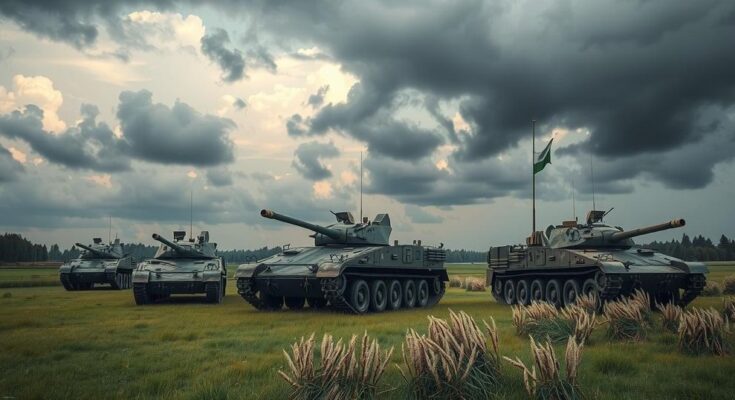Ukrainians are bracing for a new Russian offensive that may pressure Ukraine and enhance Russia’s negotiating stance in ceasefire talks. Analysts believe this offensive could coincide with a renewed focus on territorial expansion by Russia as military engagements escalate along the front line, complicating prospects for meaningful negotiations between Ukraine and the Kremlin.
Ukrainians anticipate a renewed military offensive by Russia to enhance its leverage during ceasefire negotiations. This strategy, as expressed by Ukrainian military analysts, aims to increase pressure on Ukraine and justify further territorial ambitions, undermining the potential for genuine dialogue to conclude the ongoing conflict. As fighting season approaches, the Kremlin is reportedly planning a comprehensive assault along the extensive front line encompassing 1,000 kilometers (621 miles).
Ukrainian President Volodymyr Zelenskyy has cited intelligence indicating imminent Russian offensives in regions such as Sumy, Kharkiv, and Zaporizhzhia. Zelenskyy remarked on the Kremlin’s delay tactics in negotiations, asserting, “They’re dragging out the talks and trying to get the U.S. stuck in endless and pointless discussions,” suggesting that Russia’s ultimate goal is to negotiate from a position of strength.
Russian President Vladimir Putin recently asserted that the “strategic initiative is completely in the hands of the Russian armed forces.” This claim reflects the ongoing aggressive approach by Russia to secure tactical advantages ahead of the anticipated broader offensive. Ukrainian military analysts suggest that the current operations will likely extend throughout the year as Russia strives for further territorial gains.
The renewed offensives have already had significant implications, with intensified battles in areas such as Pokrovsk, a strategic stronghold in Donetsk. Ukrainian commanders warn of the possibility of Russia redeploying seasoned forces from the successful campaigns in Kursk to intensify efforts in other regions. This shifting of troops is expected to offer Russia a critical advantage in upcoming confrontations.
Alongside military actions, Russia has reportedly intensified reconnaissance missions aiming to uncover and eliminate Ukrainian defenses. This tactical shift has raised concerns about an imminent large-scale offensive, particularly in critical areas around Pokrovsk and Zaporizhzhia. Analyst comments suggest a prevailing belief in Russia’s potential to achieve decisive offensive success within the next six months, further destabilizing Ukrainian defense lines.
Despite ongoing military preparations, the negotiation landscape remains contentious. Russian preconditions for negotiations, especially regarding economic sanctions and ceasefire terms, have stalled discussions facilitated by the U.S. Ukrainian forces express skepticism, with one soldier stating, “No one believes in them,” reflecting the prevailing uncertainty and concern about the current combat situation amidst expectations of further hostilities.
In summary, the prospect of a renewed Russian offensive looms over the ongoing conflict in Ukraine, as military analysts foresee strategic maneuvers aimed at amplifying Russia’s negotiating power. Despite Ukrainian preparations and responses, the persistence of aggressive Russian tactics poses significant challenges. The landscape of negotiation appears fraught with difficulties, as both sides navigate complex military and diplomatic terrains, leaving the future of Ukraine’s territorial integrity in question.
Original Source: apnews.com




